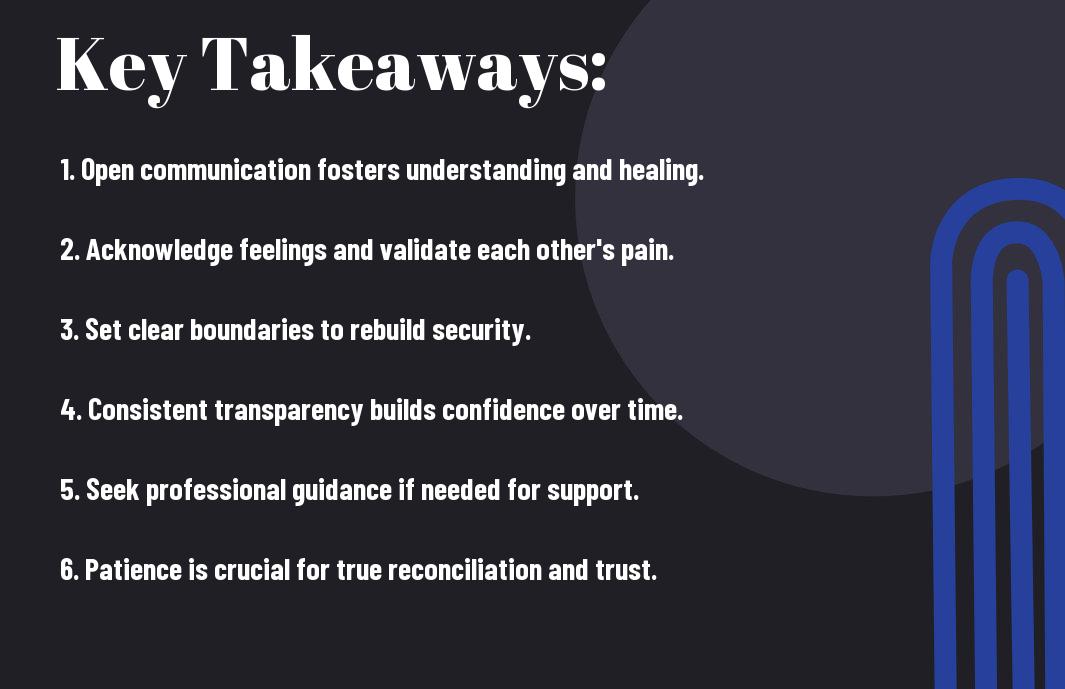Restore your relationship and rebuild the foundation of trust that has been shaken by infidelity. This journey can be challenging, but with the right steps, you can start to heal the wounds and create a stronger bond. In this blog post, you will discover effective techniques to navigate through the pain, communicate openly, and establish mutual understanding with your partner. Embrace the process of healing, and take proactive measures to foster resilience in your relationship.
Key Takeaways:
- Open communication is crucial; partners should express their feelings, concerns, and expectations transparently.
- Establish a timeline for healing, acknowledging that restoring trust is a gradual process that requires patience.
- Take responsibility for actions; the unfaithful partner should own up to their mistakes and apologize sincerely.
- Set boundaries and agree on new rules to prevent future infidelity and foster a sense of security.
- Engage in joint activities and reconnect emotionally to rebuild intimacy and strengthen the relationship.
- Consider professional help, such as couples therapy, for guidance and support throughout the healing journey.
- Focus on rebuilding trust through consistent actions; the unfaithful partner must demonstrate reliability over time.

Understanding Infidelity
While infidelity can shake the very foundation of a relationship, grasping its complexities is crucial for healing. Understanding why it occurred can be the first step in addressing the underlying issues and moving toward restoration. Recognizing the emotional, psychological, and situational factors that contribute to infidelity allows you to navigate the path toward rebuilding trust.
Types of Infidelity
Above are common types of infidelity, each requiring different approaches for reconciliation:
| Emotional Affair | Involves deep emotional connections without physical intimacy. |
| Physical Affair | Includes sexual interactions without emotional ties. |
| Online Affair | Engagement in romantic activities via digital platforms. |
| One-Night Stand | Brief, impulsive sexual encounters. |
| Situational Infidelity | Occurs due to specific circumstances, like travel or stress. |
Thou must recognize the type of infidelity in your situation to effectively address the issues at hand.
Impact on Trust
An affair can cause devastating damage to trust and intimacy. The shock of betrayal often leads to feelings of confusion, anger, and heartbreak. You may question your partner’s honesty and reliability, leading to a breakdown of communication and security within the relationship.
Also, the impact of infidelity manifests in various ways, undermining the emotional and psychological aspects of your relationship. It can lead to a sense of isolation, where you struggle to express your feelings or fears due to the fear of further betrayal. If you cannot openly discuss your emotions, it becomes increasingly challenging to rebuild the trust that once existed. Acknowledging these feelings allows you to address the deep-seated pain and work towards re-establishing a bond that feels safe and secure. By committing to open communication and honesty, you will pave the way for healing and renewal.

Acknowledging Emotions
There’s a complex range of emotions that surface after infidelity, including hurt, anger, and confusion. Acknowledging these feelings is vital for both partners as it lays the groundwork for healing and rebuilding trust. To explore valuable insights, check out Reviving Trust After an Affair (part 2).
For the Betrayed Partner
After experiencing betrayal, it’s important to express your feelings openly. You may feel overwhelmed by anger, sadness, or disbelief. Addressing these emotions allows you to process your pain and fosters a healthier dialogue with your partner, facilitating the healing process.
For the Betrayer
One of the most significant steps for you is to empathize with your partner’s feelings. It’s necessary to listen actively and acknowledge the distress you’ve caused, which can aid in rebuilding trust.
Due to the weight of your actions, it’s normal to feel an array of emotions such as guilt and shame. At this moment, showing authentic remorse can help bridge the gap. This involves taking full responsibility, without excuses, and allowing your partner to express their pain. While this may be challenging, doing so demonstrates a commitment to understanding and repairing the relationship, paving the way for potential reconciliation.
Open Communication
Unlike before the infidelity, fostering a culture of open communication is imperative for rebuilding trust. You must create an environment where both partners feel comfortable expressing their thoughts, feelings, and concerns without fear of judgment. This transparency helps in addressing underlying issues and facilitates healing, enabling you both to move forward together.
Establishing Safe Spaces
Along the journey of restoring trust, it’s vital to create safe spaces for conversation. These are environments where both you and your partner can share openly about your feelings and experiences without interruption or negativity. Setting boundaries around these discussions ensures that each person feels respected and valued, ultimately promoting connection and understanding.
Discussing Expectations
Beside establishing safe spaces, another important aspect is clearly discussing expectations regarding the relationship moving forward. By articulating what you both want and need, you are laying a foundation for mutual understanding and cooperative growth. Having these discussions can prevent misunderstandings and miscommunication that may arise in the future, further solidifying your commitment to rebuilding trust.
For instance, you might explore what fidelity means for each of you moving forward. Outline your desires for communication frequency, quality time, and emotional support, as well as any boundaries that need to be established. This clarity ensures both partners are on the same page and provides a clear roadmap for your relationship’s recovery. Additionally, discussing challenges you might face and how you plan to navigate them fosters a sense of teamwork, helping to forge a stronger bond.
Rebuilding Trust
Now that both partners are ready to work toward healing, rebuilding trust becomes a priority. This process requires patience, open communication, and a willingness to confront the underlying issues that contributed to the infidelity. Fostering a safe environment where both of you can express your feelings can help strengthen the bond that has been damaged. Establishing clear expectations moving forward is vital in this journey toward trust.
Commitment to Change
For genuine restoration of trust, a commitment to change is important from the partner who was unfaithful. It involves taking responsibility for past actions and being fully dedicated to making amends. Openly discussing intentions and following through with consistent actions will demonstrate your resolve and help nurture a sense of safety for your partner.
Small Steps Toward Trust
To effectively rebuild trust, taking small, tangible steps can gradually demonstrate your commitment to the relationship. Start by being transparent in your actions and communication, allowing your partner to feel involved and informed. This might mean sharing your whereabouts or being open about your feelings, which fosters mutual understanding.
Due to the sensitive nature of rebuilding trust, starting with small, consistent actions lays the groundwork for greater intimacy and reassurance. These actions can include actively listening to your partner’s concerns, truly empathizing with their feelings, and being reachable whenever they need you. Additionally, practicing transparency in your daily life allows your partner to track your reliability, helping them feel safe and valued. It is important to be patient, as these small steps create a framework for a more profound, enduring connection over time.

Seeking Professional Help
Keep in mind that healing after infidelity can be challenging, and seeking professional help is often necessary. A therapist can guide you through this painful experience, helping both partners navigate their emotions, communicate effectively, and rebuild the foundation of your relationship. Therapy provides a safe space for you and your partner to express feelings openly while learning necessary techniques to restore trust.
When to Consider Therapy
The decision to seek therapy can depend on the depth of pain caused by infidelity, the willingness of both partners to improve, and the desire for better communication. If you find yourself facing endless arguments, unresolved feelings, or an inability to move forward, it may be time to seek professional guidance.
Types of Therapy Options
With various types of therapy available, it’s necessary to choose one that fits your needs. Here are some popular options:
| Therapy Type | Description |
| Couples Therapy | A collaborative process that focuses on improving communication and understanding between partners. |
| Individual Therapy | Focusing on personal feelings and issues, helping you better understand your emotions. |
| Group Therapy | Provides support from others who have experienced similar issues, creating a sense of unity. |
| Emotionally Focused Therapy | A structured approach that helps partners identify and express their emotions in a healthier way. |
| Attachment-Based Therapy | Focuses on how emotional attachment impacts relationship dynamics and provides coping strategies. |
Consider exploring each type to find what resonates with you and your partner. Therapy can be a transformative experience that not only addresses infidelity but also fosters stronger connections. Here are some benefits:
- Improved Communication
- Better Understanding
- Emotional Healing
- Conflict Resolution Skills
- Strengthened Commitment
The right therapy can make a significant difference in your journey toward restoring trust.
Moving Forward Together
Despite the painful journey of infidelity, it is possible to pave a new path together. Trust can be rebuilt by embracing open communication and fostering honesty within the relationship. By working as a team, you can face challenges and celebrate small victories, creating a stronger emotional bond as you move forward.
Creating New Memories
Among the best ways to heal your relationship is by creating new, positive memories together. Engage in activities that ignite joy and bring you closer, whether it’s exploring a new hobby, traveling to a new destination, or spending quality time with friends and family. Each experience will help replace the painful memories with fresh and uplifting ones.
Setting Future Goals
Across your journey of healing, setting future goals can act as a beacon of hope for your relationship. Consider discussing both individual and shared aspirations, as they can provide a sense of direction and purpose. It’s about envisioning a life where you both feel excited and committed to the future ahead.
The process of setting future goals bridges the gap between your past and the new chapter of your relationship. Focus on aligning your individual dreams with shared aspirations, be it personal growth, financial stability, or family planning. This helps establish a common vision, fostering teamwork and unity. As you work together towards these objectives, you will build a more resilient bond, reinforcing your commitment to one another and creating a positive trajectory for your future.
To wrap up
Following this step-by-step approach to restoring trust after infidelity, you can begin to rebuild your relationship with a sturdy foundation. Prioritize open communication and emotional transparency, allowing both you and your partner to express feelings and concerns. Set realistic expectations for recovery and establish consistent efforts to address underlying issues. By committing to this process, you can foster understanding and compassion, ultimately leading to a healthier, more resilient relationship.
FAQ
Q: What is the first step in rebuilding trust after infidelity?
A: The initial step in rebuilding trust involves open and honest communication. Both partners need to discuss the infidelity, expressing their feelings, concerns, and desires. The unfaithful partner should show genuine remorse, acknowledging the pain caused and taking full responsibility for their actions. This conversation sets the foundation for rebuilding trust, as it establishes transparency and openness moving forward.
Q: How can the betrayed partner begin to heal?
A: Healing for the betrayed partner requires self-care and support. Engaging in activities that promote mental and emotional well-being, such as therapy, support groups, or journaling, can be beneficial. It’s necessary for them to process their emotions in a safe environment, ensuring they give themselves permission to grieve and heal at their own pace.
Q: Is it necessary to establish boundaries during the healing process?
A: Yes, establishing boundaries is vital for both partners during this period. The betrayed partner may need to outline what behaviors or actions would help them feel safe and respected moving forward. Meanwhile, the unfaithful partner can agree to these boundaries and work diligently to adhere to them, creating an environment of trust and safety for both individuals.
Q: How can couples effectively communicate their needs to each other after infidelity?
A: Effective communication post-infidelity involves active listening and empathy. Couples should set aside dedicated time for discussions, ensuring that each partner can express their feelings without interruption. Using “I” statements can help to articulate needs without assigning blame. It’s also beneficial to check in regularly on each other’s emotional states and needs, reinforcing a supportive dialogue.
Q: When should couples consider professional help in restoring trust?
A: Seeking professional help is advisable if couples find it challenging to navigate their feelings or if the emotional burden feels overwhelming. A therapist specializing in infidelity can provide tools and strategies to aid in rebuilding trust. They offer a neutral space where both partners can safely express their emotions and work through complex issues, facilitating a healthier path toward reconciliation.
